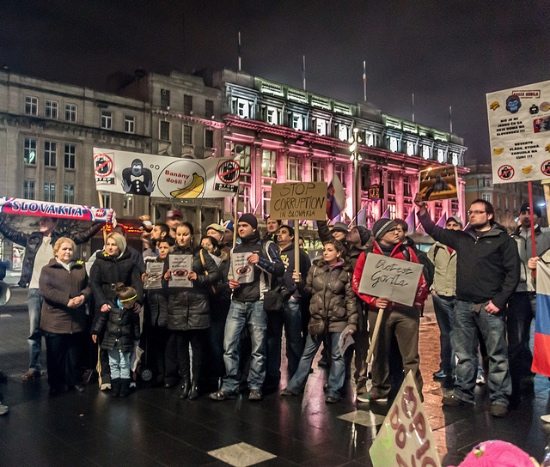
April 30, 2017; New York Times
Is an Arab Spring-style uprising bubbling up across Europe? Thousands of youth protestors recently took to the streets in Slovakia for an anti-corruption march, on the heels of similar protests in Romania, Macedonia, and Hungary, where academic freedom is under fire. Pushback against corruption has also roiled Russia, where young people remain as Vladimir Putin’s “long-term challenge.”.
There are a few factors driving the trend, if it can be called that: corruption, the rise of nationalism and populism, and new generations finding their place in civil society. As the New York Times assessed:
Corruption has been a stubborn problem in many of the former Communist countries of Eastern Europe. Things have grown so bad that some analysts now speak in terms of “state capture”—where all major state institutions are effectively in the hands of corrupt politicians and untouchable oligarchs. The problem is entering an even more critical stage, as authoritarian-minded leaders leverage the rise of nationalism and populism to consolidate power.
But, “corruption is not the only target of the demonstrations,” the Times reports, although it can be a catch-all for leaders consolidating power by weakening civil society, the rule of law, and a free press. The recent protests are also capturing attention because of the young age of the participants. And, the same issues have ignited protest in other parts of the world, as well, including Venezuela, and Brazil.
Here in the U.S., we’ve seen waves being made by large-scale protests, including the Women’s March, March for Science, Tax Day, May Day, and the Climate Change march. However, U.S. resistance efforts have appeared to be more multi-generational, although sporadic actions at colleges and high schools have popped up and longer-term movements like Black Lives Matter are fueled by young energy.
Of course, the rise of social media and declining employment following a global recession could be fueling new movements, as was largely the case with the so-called Arab Spring (not to mention climate change acting as a threat multiplier).
Senator John McCain also pointed to the ripple effects of the international refugee crisis as a factor in the uprisings in an opinion piece in the Washington Post calling for more American involvement in the region:
Sign up for our free newsletters
Subscribe to NPQ's newsletters to have our top stories delivered directly to your inbox.
By signing up, you agree to our privacy policy and terms of use, and to receive messages from NPQ and our partners.
First, the United States has to show up. As the prime minister of one southeastern European country told me, in no other region of the world do the words of American leaders carry greater weight or have a greater chance of spurring meaningful action toward progress. That is why sustained engagement and more frequent visits to the region by high-ranking U.S. officials to the region are so important…
Finally, the United States must stand by the right of every nation in southeastern Europe to choose its own future free from outside interference, whether that be from an aggressive Russia that seeks to redraw the borders of Europe through violence or the terrorists who seek to destroy our common civilization. Expanding and deepening security cooperation with our regional allies and partners is essential.
We must be prepared to uphold this commitment again in southeastern Europe, for the lessons of history are clear: We ignore this region at our own peril.
Unfortunately, increasing American engagement abroad is not a top priority for the current administration, which has proposed devastating cuts to the State Department and has a mixed record on promoting human rights so far. However, politicians on both sides of the aisle have denounced the draft budget proposal.
Can political parties abroad afford to ignore the youth bloc? According to an op-ed written by Ivan Krastev, the chairman of the Center for Liberal Strategies, in the Times, the answer is unclear:
Ruling parties can certainly decide to ignore the protests of the young. The reality in Central Europe is that, thanks to low birthrates and emigration, young people are a small and shrinking minority. According to 2016 government-sponsored report, one-third of Hungarians between 18 and 29 would consider moving away… But while ignoring the demands of the youth appears to be a promising electoral stratagem—it is easier to play on the fears of the old generations than to satisfy the hopes of the younger ones—it is ultimately self-defeating both socially and economically.
Quartz points the finger back at those youth, who haven’t shown up at the ballot box despite their concerns, while identifying a hopeful trend.
More than half of 18- to 34-year-olds in 35 countries said they would actively participate in a large-scale uprising against the generation in power if it happened in the next days or months. Lesson learned—want to engage the next generation? Take to the streets!—Anna Berry











